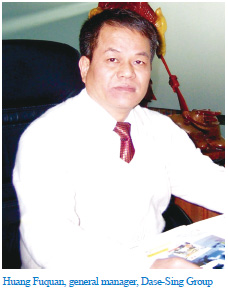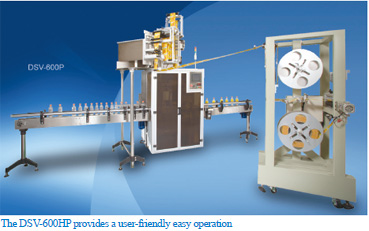 From leading the high-speed labelling market in China to spearheading eco-friendly labels, Dase-Sing is always up for the challenge. General manager LEO HUANG FUQUAN shares his insights with FPMJ on what makes the company tick.
From leading the high-speed labelling market in China to spearheading eco-friendly labels, Dase-Sing is always up for the challenge. General manager LEO HUANG FUQUAN shares his insights with FPMJ on what makes the company tick.Compared to ten or even five years ago, shrinkable labels now dominate the label industry. What are your markets like today? China is the largest market for us in Asia. Over the past decade, Dase-Sing's high-speed sleeve labelling machine has built up our share in China's food & beverage industry to 80 per cent of the market. India and Viet Nam are potential markets, as famous beverage producers in these two countries, such as Coca-Cola, Pepsi and THP, have chosen our equipment. In fact, we are planning a series of promotions for the Indian market. Today's Indian market is about the same size as the Chinese market was 15 years ago, but we believe that gradually opening diplomatic policy and rapid development of information technology will drive a huge development never seen before in the Indian market. Indian market is expected to gradually growing in following years. What factors contributed to this shift from paper labels to plastic labels? Today, most beverage and commodities use plastic labels, whilst some products with special marketing requirements or made by environment-conscious manufacturers choose paper labels. Paper labels have been mostly applied to beverage bottles, which easily accumulate humidity during refrigeration, causing paper labels to break. Another shortcoming of paper labels is their unsuitability to specially shaped bottles. Plastic labels were developed to solve such problems. Besides solving the above problems, plastic labels have also the advantage of lower cost. Plastic labels do have their shortcomings - environment unfriendliness, in particular. This is why Dase-Sing focused on environment-friendly, corn-based PLA label several years ago. As for performance, the surface of PLA sleeves has a superior brightness, helping to improve the overall impression of package. Its relative high cost, however, prevents its wide use.
 From my point of view, as a result of continuous development of plastic labels and their reducing cost, plastic labels will eventually replace most paper labels. In what way have consumer attitudes contributed to this shift? Most Asian consumers today don't really care about the label material on beverage bottles, and whether or not it is environment friendly. They're more interested in a package with an attracting appearance, effective graphics and low cost. But I believe that the situation will eventually change with increasing environment awareness of consumers and growing development of environment friendly products by the industry. In terms of labelling equipment, which machines are you best sellers and what features differentiate them from competitive models? For years, high-speed sleeve labelling machines from Shanghai Dase-Sing have had an absolute advantage in the field because of their excellent stability and user-friendly design. Amongst these, the DSL-800A and DSV-600HP high-speed sleeve-labelling machine are most favoured by the industry. The DSL-800A applies 180mm labels at a speed of up to 800 bottles per minute. As the fastest single head labelling equipment in the world, it perfectly meets beverage and other industries' demand for fast and reliable production. Meanwhile, with speeds up to 600 bottles per minute and a protection shell mounted with human-machine interface control system, the DSV-600HP provides a user-friendly easy operation. Dase-Sing was amongst the participating corporations in the recent 2010 Asia Trade Mission to Taipei, Chongqing, Shanghai and Beijing organised by the US-Pan Asian American Chamber of Commerce Education FoundationAir Jordan III 3 Shoes
From my point of view, as a result of continuous development of plastic labels and their reducing cost, plastic labels will eventually replace most paper labels. In what way have consumer attitudes contributed to this shift? Most Asian consumers today don't really care about the label material on beverage bottles, and whether or not it is environment friendly. They're more interested in a package with an attracting appearance, effective graphics and low cost. But I believe that the situation will eventually change with increasing environment awareness of consumers and growing development of environment friendly products by the industry. In terms of labelling equipment, which machines are you best sellers and what features differentiate them from competitive models? For years, high-speed sleeve labelling machines from Shanghai Dase-Sing have had an absolute advantage in the field because of their excellent stability and user-friendly design. Amongst these, the DSL-800A and DSV-600HP high-speed sleeve-labelling machine are most favoured by the industry. The DSL-800A applies 180mm labels at a speed of up to 800 bottles per minute. As the fastest single head labelling equipment in the world, it perfectly meets beverage and other industries' demand for fast and reliable production. Meanwhile, with speeds up to 600 bottles per minute and a protection shell mounted with human-machine interface control system, the DSV-600HP provides a user-friendly easy operation. Dase-Sing was amongst the participating corporations in the recent 2010 Asia Trade Mission to Taipei, Chongqing, Shanghai and Beijing organised by the US-Pan Asian American Chamber of Commerce Education FoundationAir Jordan III 3 Shoes
 iConnectHub
iConnectHub
 Login/Register
Login/Register Supplier Login
Supplier Login



























